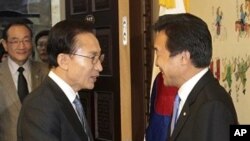South Korea's president has made an unprecedented visit to the country's legislature to press for ratification of a critical trade agreement signed with the United States. But his personal appeal did not immediately break a deadlock.
South Korean lawmakers say President Lee Myung-bak promised them if they ratify the trade pact he will request that Washington re-open negotiations about a controversial clause.
Kim Ki-hyun, the spokesman for the governing Grand National Party, says the president pledged to legislators he would insist, within three months after ratification, the United States hold talks with South Korea about the investor-state dispute - or ISD - clause.
The offer came during Lee's first such visit to the National Assembly since he took office in early 2008.
The pact, known as the Korea-U.S. Free Trade Agreement, was signed nearly four-and-a-half years ago.
The deal would be the most significant such agreement for the United States since the 1994 North America Free Trade Agreement with Canada and Mexico.
Minor modifications, interpreted as concessions by South Korea which mainly affect U.S. concerns about access to the automotive sector, were made at the end of last year.
The agreement was ratified by the U.S. Congress last month. Since then domestic opponents have waged a campaign to re-open negotiations with the United States, which the administration here has called unrealistic.
South Korean critics of the agreement demand removal of the ISD clause that would allow foreign investors to take disputes to an international arbitration panel. They call the provision an infringement of South Korea's sovereignty and had insisted President Lee discuss their objections with U.S. President Barack Obama on the sidelines of the just-concluded APEC summit in Hawaii.
The South Korean presidential office says no such meeting took place.
Democratic Party spokesman Lee Yong-sub says his fellow DP lawmakers will meet Wednesday to consider the president’s proposal to seek new negotiations with the United States, but only after the pact's passage in Seoul.
The opposition party spokesman says at this juncture the Democrats' stance remains that the ISD clause is not acceptable.
The last-minute debate has erupted into an emotional public issue.
Opponents, including farmers, have held several - mostly peaceful - street rallies and some lawmakers continue to barricade a meeting room to block approval by a key legislative committee.
A legislator from the Grand National Party, which supports passage, says he is on a hunger strike demanding the agreement be approved without violence. Some citizens favoring the legislation have protested outside GNP lawmakers' offices, calling them weak for not forcing the pact through the National Assembly.
Although the governing GNP has enough votes to ram through ratification, it wants to avoid a likely violent confrontation with the opposition that would follow.
Analysts say both sides are maneuvering in anticipation of next year's legislative and presidential elections and at a time of rising public discontent with both of the major political parties.
South Korean President Proposes Deal for US Trade Pact
- By Steve Herman





